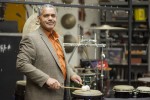UCLA faculty, staff and alumni have contributed musical works that are nominated for the 59th annual Grammy Awards on Feb. 12, 2017. Their talents, ranging from playing the saxophone to composing songs to performing in an opera, have been recognized with nominations in five different categories.
Three UCLA lecturers brought together the realms of rock ‘n’ roll and classical music, honoring the musical legacy of Frank Zappa.
In October 2013, the Los Angeles Philharmonic, the Los Angeles Master Chorale, Zappa’s former band member Scott Thunes and Zappa-family collaborator Joe Travers played the score to Frank Zappa’s 1971 film “200 Motels.”
Zappa, a rock musician known for his experimentalism and satire, died in 1993, but his works such as “200 Motels” haves since been revived and reinterpreted.
UCLA lecturers Raynor Carroll and John Steinmetz and adjunct professor Douglas Masek were among the 115 orchestra members, 13 singer-actors and 32 choral performers who participated in the show at the Walt Disney Concert Hall.
The recording of the one-night-only performance is now up for a 2017 Grammy Award for Best Classical Compendium after being released in November 2015.
Participating in the show required intense preparation of the classically-trained performers, who ultimately delivered a genre-bending performance for Zappa fans, Carroll said.
Carroll, who played percussion with the Los Angeles Philharmonic for 20 years, served as principal percussionist for the live show, determining how many parts were needed for the percussion section, assigning the parts and organizing where each instrument was on stage during the performance.
“I had to sort of choreograph behind the actual choreography of the show,” said Carroll.
Carroll himself alternated between 19 different instruments throughout the show, ranging from a glockenspiel to finger cymbals to a guiro, an instrument played by rubbing a stick along its ridges. With so many instruments to handle, the preparation for the show was the most comprehensive that Carroll had been a part of, he said.
Masek, a freelance saxophonist who has worked with the LA Philharmonic before, played both the alto and baritone saxophones for the performance, alternating between them throughout the show.
Freelancer Steinmetz was selected by the LA Philharmonic two rehearsals before the performance to play bassoon, as the original bassoonist had to be replaced.
The story of “200 Motels” centers on a surreal narrative of Zappa’s band, the Mothers of Invention, as they embark on absurd escapades characteristic of rock stars of the 1970s.
Zappa composed all of the music in the film by drawing and mixing elements from rock ‘n’ roll and classical music, Steinmetz said.
A bulk of the performance’s energy came not only from Zappa’s lively composition, but also from the audience in attendance, Steinmetz said.
“The crowd, being Zappa fans, had a lot more energy than the crowds that usually go to (classical performances), so the orchestra fed off that as well,” Steinmetz said.
The vitality that made Zappa’s music dynamic also presented technical difficulties to its players, Masek said. Zappa had a wide array of compositional inspirations from classical composers like Igor Stravinsky to artists of the R&B genre – and the music in “200 Motels” reflected the complexity, he said.
“He kind of threw everything together in this piece,” Masek said.
The loud, energetic nature of the show was unlike what many of the LA Philharmonic artists like Masek had performed. Masek described the performance as slightly raunchy; he said a few musicians refused to perform in the show due to its unconventional nature.
However, the performers who did join the piece all enjoyed stepping out of their comfort zones into the fusion music of Zappa, Masek said.
The artists considered the music difficult, and the complex music reflected the theme of the surrealist show itself, Steinmetz said. The sound from the rock band, choral singers and orchestra reflected the absurd rockstar antics being portrayed on stage, Steinmetz said.
“The energy was incredible,” Steinmetz said. “The orchestra was having so much fun playing directly with the rock band.”
